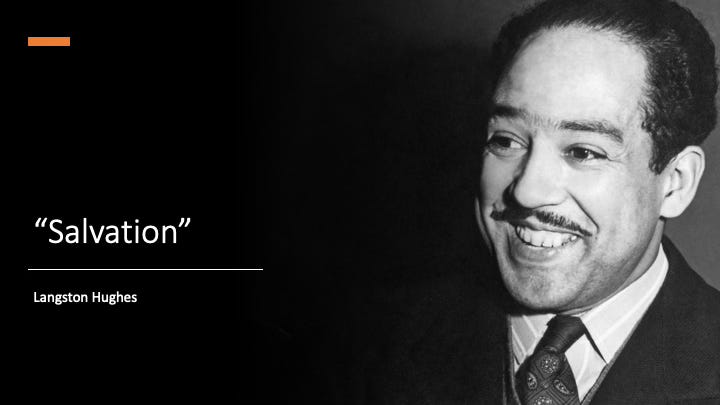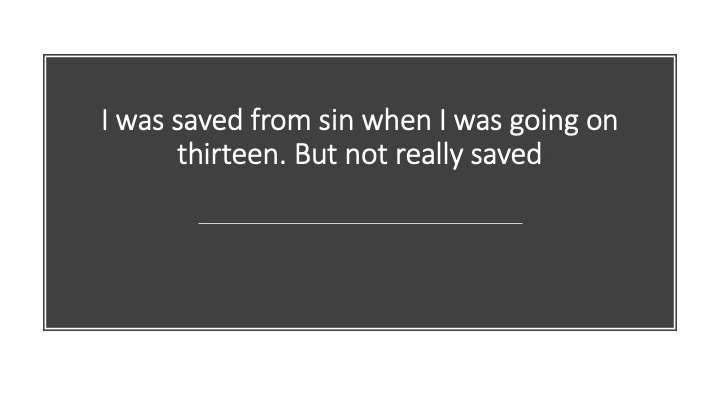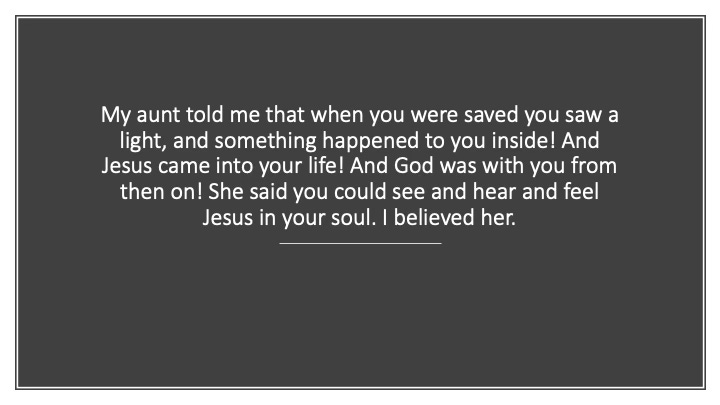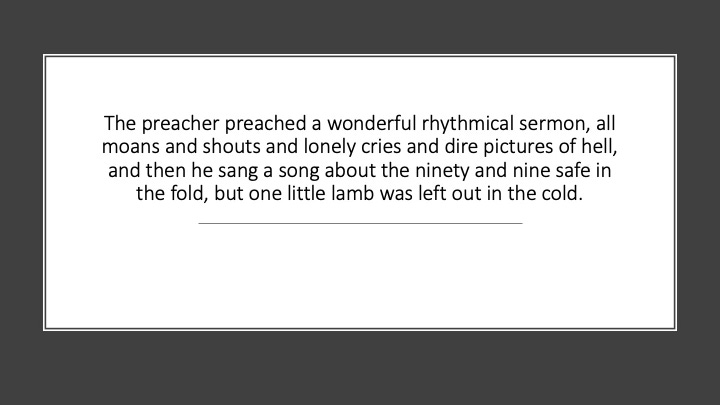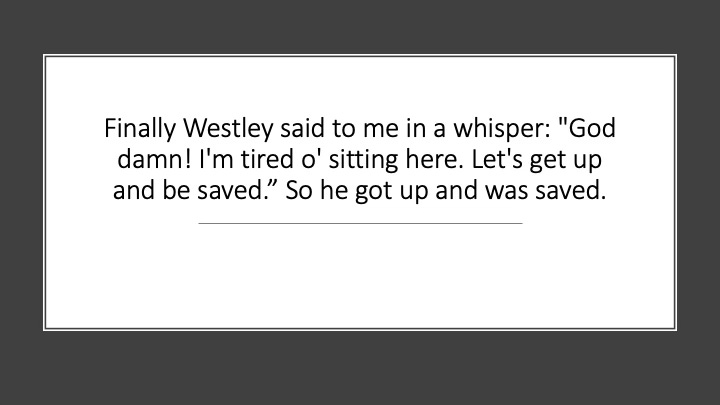Stories of Belief: "Salvation" by Langston Hughes
This week, in Stories of Belief, we read the first chapter from Langston Hughes' memoir
This is the third entry in my series “Stories of Belief.” You can read more about the series here. The entirety of this short selection is online and you can read it here.
Langston Hughes lived from 1901-1967. He was originally from Joplin, Missouri, but he moved to New York City, where he became a significant figure in the Harlem Renaissance. He wrote plays, poems, and short stories. The essay for today, “Salvation,” is the third chapter of Hughes’ memoir The Big Sea.
The story begins with Hughes saying he was saved, but then he quickly backtracks, writing, “but not really saved.” The fact that he immediately contradicts himself informs my reading of this story as being told by two characters – two versions of Langston Hughes. I'll call them Young Langston and The Writer Hughes.
When the story begins, Young Langston — he’s 12-years-old — is sitting on the mourners bench. If you’re not familiar with this, in Methodist and some evangelical churches it’s the front row pew where non-Christians or people who needed to repent were sat.
So, Young Langston is sitting there and he’s waiting in anticipation of what his aunt said was supposed to happen: “something happened to you inside! And Jesus came into your life! And God was with you from then on!”
Look at all the exclamation points! In this way, he’s communicating both his aunt's excitement, but also the excitement of Young Langston about the prospect of being saved.
But again, we move quickly from the voice of Young Langston, to the writer Hughes. See how he describes the sermon: the preacher preached a wonderful rhythmical sermon, all moans and shouts and lonely cries and dire pictures of hell…"
This is the Writer Hughes. He writes that when they were singing and praying “the whole building rocked with prayer and song.”
And then we’re back to Young Langston’s voice, with more exclamation points, “I kept waiting serenely for Jesus, waiting, waiting—but he didn’t come. I wanted to see him, but nothing happened to me. Nothing! I wanted something to happen to me, but nothing happened.”
In time, as the other children answer the alter call and make their way to the front, Young Langston begins to feel ashamed. And why wouldn’t he? Look at the pressure he's under; his aunt is sobbing, “Why don't you come; Langston, why don't you come?”
So, interestingly, Young Langston is ashamed because he’s holding everything up, not because he hasn’t seen Jesus.
Sitting with him on the mourner’s bench is his new friend Westley, but Westley gets tired of waiting and eventually abandons Young Langston. So, Young Langston reasons that he’d better lie, too, just like Westley. “God had not struck Westley dead!,” he thinks.
So Young Langston gets up and the crowd erupts because, finally, he is saved — but not really. Later, when he’s back home, he goes to his room and he cries. His aunt, who is so proud of him for getting saved, thinks he’s crying tears of joy, but instead, he tells us: “I hadn’t seen Jesus, and that now I didn’t believe there was a Jesus anymore, since he didn’t come to help me.”
So here at the end, who is speaking, the boy or man?
This whole story, I argue, hinges on the word “now.” I think of this as the place where, after being bifurcated in the remembering, the two Langstons meet: “now” he didn’t believe then, and “now” he doesn’t believe.
Let’s conclude by considering the title, “Salvation.” Read one way, the title is obviously ironic. We know he didn’t get saved that day. But there's another way we could read the title; how might this be a story about salvation?
In order to answer that question, we have to ask another question, saved from what? I’d argue that Langston Hughes believes that on that day, as a child looking for salvation from Jesus, he was, instead, saved from belief.
So, this is clearly a story about losing belief, and, in the telling, it is a sad story – I mean, it ends with a 12-year-old boy sobbing in his bed. But, for a man who is grown – The Writer Hughes – and has lived a successful life without belief, why would he write this story as sad? Why would even a person who had accomplished all that Hughes had look back with sadness at the loss of belief?
Just as much as he is saying that he was saved from belief, I think that this story argues that there is something inherently sad about losing belief.
There’s an interesting coda to this story. In 1932, when Hughes was 31, he wrote a poem titled “Goodbye, Christ.” According to Wallace Best, Hughes wrote the poem “while on a trip to Russia in 1932…but apparently never intended to publish it.” His friend Otto Huiswood got a copy of the poem, however, and “sent it to the Negro Worker, the COMINTERN—Communist Third International journal based in Germany—(without Hughes’s permission or consent) where it appeared in the journal’s November-December issue.”
Wallace Best writes, “‘Goodbye, Christ,’ became a lightning rod in many American and African American communities, generating debates about Hughes, the political efficacy of poetry, and the state of American religion. A true touchstone, it was a hot topic in schools, social clubs, private parties, places of employment, and churches. There had been few literary works by an African American that proved to be so controversial among African Americans.”
Here’s the text of the poem, which I think is interesting to read in light of “Salvation”:
“Goodbye Christ.”
Listen, Christ,
You did alright in your day, I reckon-
But that day’s gone now.
They ghosted you up a swell story, too,
Called it Bible-
But it’s dead now,
The popes and the preachers’ve
Made too much money from it.
They’ve sold you to too manyKings, generals, robbers, and killers-
Even to the Tzar and the Cossacks,
Even to Rockefeller’s Church,
Even to THE SATURDAY EVENING POST.
You ain’t no good no more.
They’ve pawned you
Till you’ve done wore out.Goodbye,
Christ Jesus Lord God Jehova,
Beat it on away from here now.
Make way for a new guy with no religion at all-
A real guy named
Marx Communist Lenin Peasant Stalin Worker ME-
I said, ME!Go ahead on now,
You’re getting in the way of things, Lord.
And please take Saint Gandhi with you when you go,
And Saint Pope Pius,
And Saint Aimee McPherson,
And big black Saint Becton
Of the Consecrated Dime.
And step on the gas, Christ!
Move!Don’t be so slow about movin?
The world is mine from now on-
And nobody’s gonna sell ME
To a king, or a general,
Or a millionaire.
Thanks for reading. Next time we’ll look at “I Quit the Church” from An American Childhood by Annie Dillard. While I fully recommend An American Childhood — it was the first memoir I loved — I did find the full text of “I Quit the Church” online; it appears about halfway down this page here (this site appears to be a sermon archive — I’m not really sure — but the page’s author included the full text of “I Quit the Church,” so there you go).



